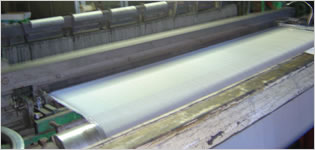Home > Products > Stainless Steel Filter Wire Mesh Screens
Common Specifications and Sizes of Stainless Steel Filter Wire Mesh Screens
Stainless Steel Filter Wire Mesh Screens are indispensable in numerous industries, renowned for their exceptional durability, corrosion resistance, and high-temperature tolerance. Crafted from premium stainless steel types such as 304 and 316, these screens offer excellent corrosion resistance and are suitable for a wide array of applications including general industrial use, marine environments, and pharmaceutical manufacturing. Available in a variety of mesh counts from coarse to ultra-fine, and in multiple shapes and sizes, they can handle temperatures up to 800°C and meet stringent industry standards such as ASTM and ISO. Commonly utilized in water treatment, chemical processing, food and beverage production, and environmental protection, these screens ensure precise filtration and separation with high efficiency, low pressure drop, and long service life. Their adaptability to extreme environments and ability to be configured to specific operational requirements make them essential for processes requiring meticulous particle separation and fluid management.
Material
-
Types of Stainless Steel
-
Type 304 Stainless Steel
- Composition and Properties
- Contains approximately 18% chromium and 8% nickel.
- Offers good corrosion resistance and excellent formability.
- Suitable for temperatures up to 870°C (1600°F).
- Applications
- General industrial use, food processing, and architectural applications.
- Composition and Properties
-
Type 316 Stainless Steel
- Composition and Properties
- Contains approximately 16% chromium, 10% nickel, and 2% molybdenum.
- Provides superior corrosion resistance, especially against chlorides and industrial solvents.
- Suitable for temperatures up to 800°C (1472°F).
- Applications
- Marine environments, chemical processing, pharmaceutical equipment.
- Composition and Properties
-
Other Stainless Steel Alloys
- Type 316L Stainless Steel
- Low carbon content (maximum 0.03%) reduces carbide precipitation during welding.
- Enhanced weldability and corrosion resistance.
- Duplex Stainless Steel
- Combines austenitic and ferritic stainless steel properties.
- High strength and excellent resistance to stress corrosion cracking.
- Hastelloy
- Nickel-molybdenum alloys with exceptional corrosion resistance in severe environments.
- Type 316L Stainless Steel
-
Wire Diameter
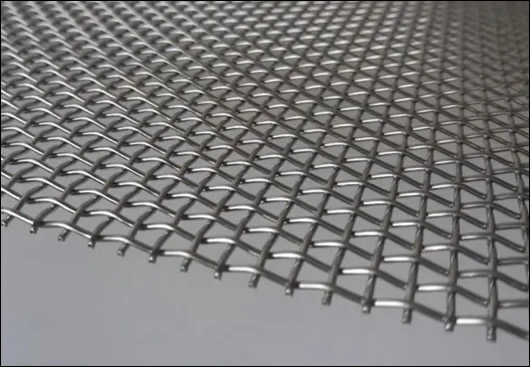
mining and mineral processing: screens and filters ore and minerals
- Standard Wire Diameters
- Ranges from 0.001 inches (0.025 mm) to 0.02 inches (0.50 mm).
- Fine Wires: 0.001 inches (0.025 mm) to 0.005 inches (0.127 mm) for high mesh counts.
- Medium Wires: 0.005 inches (0.127 mm) to 0.01 inches (0.254 mm) for general-purpose meshes.
- Thick Wires: 0.01 inches (0.254 mm) to 0.02 inches (0.50 mm) for heavy-duty applications.
- Ranges from 0.001 inches (0.025 mm) to 0.02 inches (0.50 mm).
- Impact on Mesh Properties
- Filtration Accuracy: Thinner wires enable finer mesh counts for filtering smaller particles.
- Mechanical Strength: Thicker wires provide increased durability and resistance to wear.
Mesh Count and Pore Size
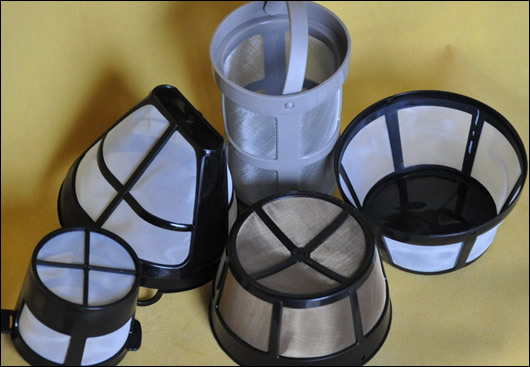
Dutch Weave Stainless Steel Wire Mesh For Food Processing Industries
-
Mesh Count (Threads per Inch)
- Common ranges from 10 mesh to 500 mesh.
- 10-80 Mesh: Coarse filtration.
- 100-200 Mesh: Medium filtration.
- 250-500 Mesh: Fine filtration.
- Metric Equivalent
- 10 mesh ˜ 4 threads per cm.
- 500 mesh ˜ 196 threads per cm.
- Common ranges from 10 mesh to 500 mesh.
-
Pore Size (Aperture)
- Determined by wire diameter and mesh count.
- Common Pore Sizes
- 10 mesh: Approx. 2000 microns (2 mm).
- 100 mesh: Approx. 150 microns.
- 500 mesh: Approx. 25 microns.
- Selection Criteria
- Based on the size of particles to be filtered and the required flow rate.
Thickness, Width, and Length
-
Thickness
- Varies according to wire diameter and mesh count.
- Typical Thicknesses
- Single-layer Meshes: 0.1 mm to 0.5 mm thick.
- Multi-layer Meshes: Can reach up to 6 mm for specialized applications.
-
Standard Widths
- 36 inches (914.4 mm).
- 48 inches (1219.2 mm).
- 60 inches (1524 mm).
- Custom Widths available upon request.
-
Standard Lengths
- Supplied in rolls of:
- 30 meters (98.4 feet).
- 100 feet (30.48 meters).
- Custom Lengths can be provided to match specific project requirements.
- Supplied in rolls of:
-
Sheet Sizes
- 4 feet x 8 feet (1219 mm x 2438 mm).
- 5 feet x 10 feet (1524 mm x 3048 mm).
Filtration Ratings and Open Area Percentage
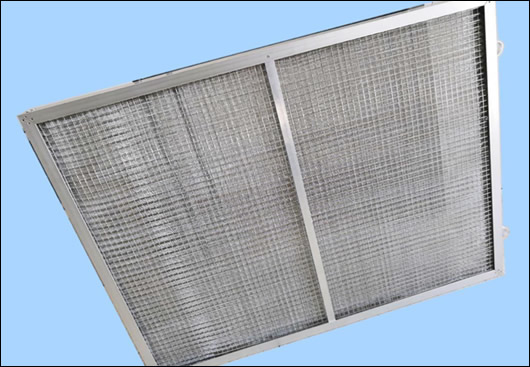
Often used in gas-liquid separation, mist elimination, and air purification.
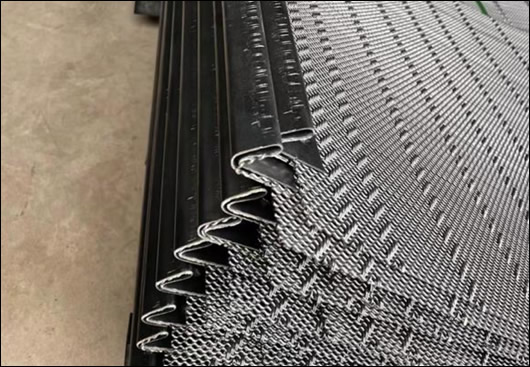
Shaker/Hooked Screens for Particle Separation
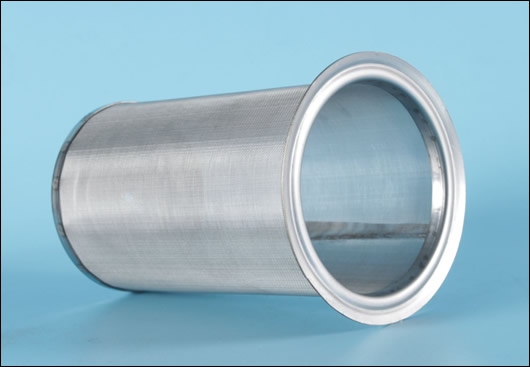
Stainless Steel Sieve Mesh: A Versatile Tool for Pharmaceutical Manufacturing
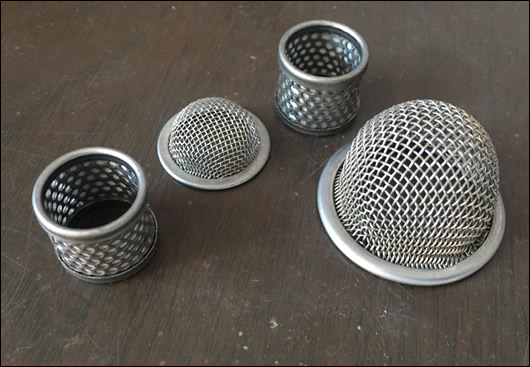
Water Treatment Screen Filters: A Vital Component in Water Purification
-
Filtration Ratings
- Expressed in microns (µm).
- Common Filtration Ratings
- 5 µm: Ultra-fine filtration.
- 10 µm.
- 25 µm.
- 50 µm.
- 100 µm: Coarse filtration.
-
Open Area Percentage
- Calculated as the ratio of open space to total mesh area.
- Typical Open Areas
- 30%: Provides fine filtration with reduced flow rates.
- 40-50%: Balanced filtration efficiency and flow.
- 60%: Higher flow rates with less filtration precision.
-
Impact on Performance
- Higher Open Area: Increases flow rate but may decrease filtration efficiency.
- Lower Open Area: Improves filtration efficiency but reduces flow rate.
Operating Temperature and Construction
-
Operating Temperature Ranges
- Type 304 Stainless Steel: Up to 870°C (1600°F).
- Type 316 Stainless Steel: Up to 800°C (1472°F).
- Type 316L Stainless Steel: Up to 800°C (1472°F) with improved weldability.
-
Construction Types
- Weave Styles
- Plain Weave
- Simplest form; each weft wire passes over and under successive warp wires.
- Suitable for most standard applications.
- Twill Weave
- Each weft wire passes over two and under two warp wires.
- Allows for heavier wires and higher mesh counts.
- Dutch Weave
- Plain Dutch Weave
- Warp wires are heavier than shute wires.
- Provides a tight mesh with small openings.
- Twill Dutch Weave
- Combines twill and Dutch weaves.
- Offers ultra-fine filtration capabilities.
- Plain Dutch Weave
- Plain Weave
- Weave Styles
-
Shapes and Forms
- Rolls
- Standard lengths, suitable for large-scale applications.
- Sheets
- Cut to specific dimensions for immediate use.
- Discs and Cut Pieces
- Custom shapes tailored to fit specific equipment or filters.
- Rolls
Standards, Surface Treatment, and Packaging
-
Standards Compliance
- ASTM Standards
- ASTM E2016: Standard specification for industrial woven wire cloth.
- Ensures uniformity in material properties and dimensions.
- ISO Standards
- ISO 4783: Specifies guidelines for woven wire mesh.
- Promotes global consistency and quality.
- ASTM Standards
-
Surface Treatments
- Passivation
- Chemical treatment that removes contaminants.
- Enhances natural corrosion resistance of stainless steel.
- Electro-Polishing
- Electrochemical process that smooths and polishes the metal surface.
- Reduces product adhesion and eases cleaning.
- Oil Coating
- Thin layer of protective oil applied to prevent oxidation during storage and transport.
- Passivation
-
Packaging
- Rolls
- Wrapped in moisture-resistant paper or plastic film.
- Ends are protected to prevent damage to the mesh.
- Sheets and Cut Pieces
- Separated by protective layers.
- Packed in wooden crates or sturdy cardboard boxes.
- Labeling
- Each package includes details such as material grade, mesh count, dimensions, and batch number for traceability.
- Rolls
Weave Types
-
Plain Weave
- Characteristics
- Simplest and most common weave pattern.
- Provides a uniform opening size.
- Applications
- General-purpose filtration, sieving, and protective barriers.
- Characteristics
-
Twill Weave
- Characteristics
- Diagonal pattern allows for thicker wires and higher mesh counts.
- Offers increased strength and finer filtration than plain weave.
- Applications
- High-pressure filtration, aerospace, and critical industrial processes.
- Characteristics
-
Dutch Weave
-
Plain Dutch Weave
- Characteristics
- Warp wires are larger, creating a mesh with wedge-shaped openings.
- Provides high mechanical strength.
- Applications
- Fine filtration of gases and liquids, hydraulic filters.
- Characteristics
-
Twill Dutch Weave
- Characteristics
- Combines twill and Dutch weave techniques.
- Produces extremely fine filtration with a tight mesh.
- Applications
- Ultra-fine filtration in chemical and pharmaceutical industries.
- Characteristics
-
Other
-
Shape Options
- Cylindrical Filters
- Mesh formed into tubes for filter cartridges.
- Conical Filters
- Tapered designs for specialized equipment.
- Custom Fabrications
- Mesh can be welded, sintered, or formed to meet unique specifications.
- Cylindrical Filters
-
Multi-layer Meshes
- Laminate Structures
- Combining layers with varying mesh counts for gradient filtration.
- Sintered Mesh
- Layers fused together through sintering for enhanced strength and rigidity.
- Applications
- Used in demanding environments requiring precise filtration and durability.
- Laminate Structures
-
Compatibility
- Chemical Resistance
- Stainless steel meshes are resistant to a wide range of chemicals.
- Type 316 and 316L offer better resistance to acids and chlorides.
- Temperature Resistance
- Suitable for both cryogenic and high-temperature applications.
- Mechanical Stress
- Can withstand vibration, pressure changes, and mechanical forces.
- Chemical Resistance
-
Quality Control
- Inspection
- Visual and dimensional checks to ensure mesh integrity.
- Testing
- Bubble Point Testing: Determines the maximum pore size.
- Flow Rate Testing: Assesses permeability.
- Certification
- Material test certificates provided upon request.
- Inspection


